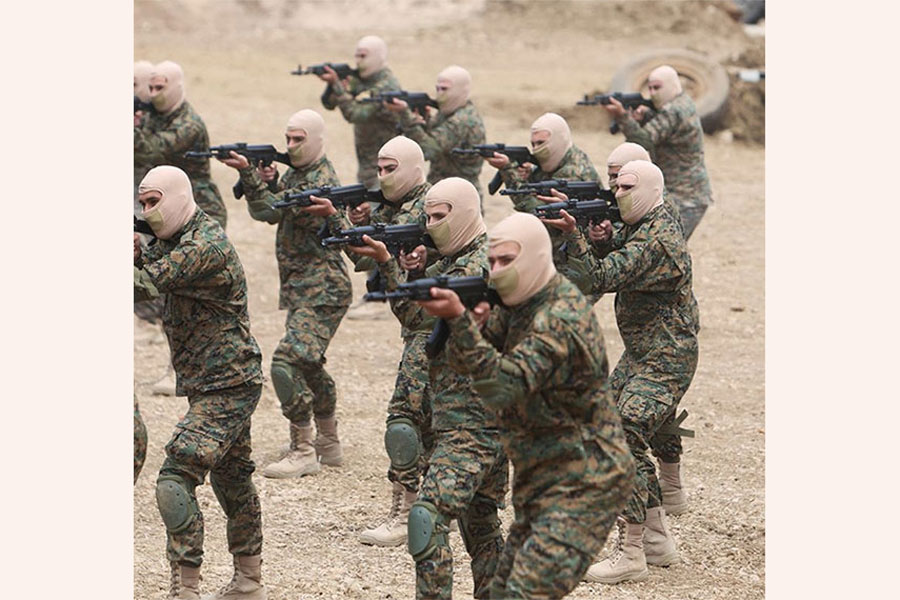
Published :
Updated :

Dispelling speculations the Lebanese Shia Islamist militant group, Hezbollah, has admitted that their supreme leader Hassan Nasrallah has been killed in Friday evening in a massive Israeli air attack in Southern Beirut. Israeli Defence Force (IDF) also claimed that in the same airstrike it killed Ali Karki, commander of Hezbollah's southern front as well as other Hezbollah commanders. Meanwhile, other senior Hezbollah leaders have been killed in Israeli attacks. With the death of Hassan Nasrallah, the secretary general of Hezbollah as a political party, virtually the group's top leadership has been decimated. Definitely it's a huge blow to Hezbollah as it is now facing a leadership vacuum and the remaining leadership is perhaps in disarray. With Hezbollah thus put on the back foot, it's definitely a turning point for Israel, which saw no significant success in its war against Palestinian resistance led by the Hamas militants in Gaza. For Hezbollah it is obviously an hour of reckoning when Israel is mercilessly continuing its bombing campaign against it in Lebanon.
The Iran-backed anti-Israel resistant group, a formidable military force of the region, has suffered a series of reversals over a fortnight. September 17's explosions of pagers and other radio devices had already hit Hezbollah hard, a fact Hassan Nasrallah himself acknowledged in his speech after the incident as saying that it dealt a severe blow to the organisation. The pager attacks obviously disrupted the internal communication network of the militant group. Though the present leadership of the organisation has expressed its defiance and determination to continue the fight against Israel to support its comrades, the Hamas fighters in Gaza, question remains about the morale, quality of leadership and level of coordination within the organisation. The pager attacks followed by serial assassination of other senior Hezbollah leaders are a clear indication of the fact that Israel knows too much about Hezbollah so much so that the movement and its leadership are constantly under Israel's scanner. No doubt the militant organisation's security system has been severely compromised.
So, what is going to happen next? Will Israel take full advantage of this security flaw of Hezbollah to launch a full-scale ground offensive in Lebanon as it did it in Gaza about a year ago? Well, mobilisation of Israeli forces on Lebanon's southern border may be indicative of an imminent offensive. There is no doubt that Netanyahu, who successfully took out Hassan Nasrallah and his close comrades one by one, spruced up his image significantly, following a year-long Gaza debacle. The Israeli public is now expecting that Netanyahu could finally give them a victory that evaded them so far in Gaza. However, if Israel remembers the history of its past ground invasions in Lebanon, it will have to think twice. Israel's invasion of Lebanon in 1982, for instance, was initially a big success. Israel's army swept through Beirut, killed tens of thousands of Lebanese civilians and drove out the Palestine Liberation Organisation (PLO) from Lebanon. There was no Hezbollah then. But Israeli occupation of Lebanon created the Hezbollah, from Shi'ite Amal movement. After splitting from Amal, Hassan Nasrallah and his associates first formed Islamic Amal, and in 1985 established Hezbollah with its stated objective of destroying Israel. He became the top leader of this organisation in 1992 at the age of 32 after the assassination of its top leader Abbas al-Musawiin in an Israeli helicopter strike.
Born in 1960 as the eldest of the nine children to Abdul Karim, who owned a small green grocery shop in Beirut's eastern Bourj Hammoud neigbourhood, Hassan Nasrallah was naturally drawn towards radical movements as Lebanon descended into a civil war in 1975.
After assuming Abbas al-Musawi's mantle as Hezbollah's top leader, he has been running the resistance group for 32 years. And the resistance war he started against the Israeli occupation forces in Lebanon actually forced Israel to withdraw its troops in 2000 from Southern Lebanon.
Other than carrying out blitzkriegs to win quick victory, Israel's capacity for sustaining long resistance of a hostile population is very limited as it has already been proved in Gaza. Killing civilians by air strikes is one thing, maintaining control over an occupied territory is quite another matter. Moreover, in consequence of the Gaza war and Hezbollah's year-long war of attrition against Israel, the economy of this Zionist state is already in a shambles. It is only through constant replenishment of depleted military arsenal of the Zionist state mainly by the US and its European allies that Israel can still continue the war against the Hamas and Hezbollah. From that point of view, the Lebanese Hezbollah and the Hamas of Gaza are not just fighting Israel. In truth, they are fighting the collective West under the leadership of the USA where Israel is a client state. The question is how long can the West continue this support for Israel, which has already lost its acceptability globally, especially for committing genocide in Gaza? Along with Israel, the collective West, too, has lost its moral high ground as the champion of human rights, democracy and other great values they claim they stand for. Not only morally, the US and its Western allies are on the wane also economically. In that case, Israel's continued existence as an apartheid, settler-colonial power backed by the decaying, decadent West is not sustainable in the long run. So, the successful assassinations of the top Hezbollah leadership by Israeli airstrikes do not mean the end of Hezbollah; nor do those signify the turn of the tide for Israel.
Israel might have won a battle against Hezbollah, but it is essentially fighting a losing war.
sfalim.ds@gmail.com


 For all latest news, follow The Financial Express Google News channel.
For all latest news, follow The Financial Express Google News channel.